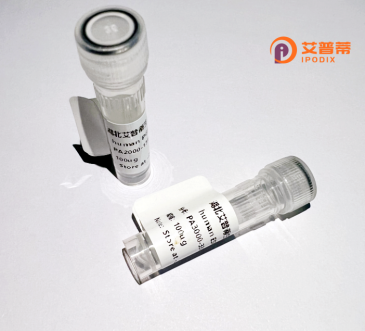
| 纯度 | >90%SDS-PAGE. |
| 种属 | Mouse |
| 靶点 | ARHGAP1 |
| Uniprot No | Q5FWK3 |
| 内毒素 | < 0.01EU/μg |
| 表达宿主 | E.coli |
| 表达区间 | 1-439aa |
| 氨基酸序列 | MDPLSELQDD LTLDDTSQAL NQLKLASIDE KNWPSDEMPD FPKSDDSKSS SPEPVTHLKW DDPYYDIARH QIVEVAGDDK YGRKIIVFSA CRMPPSHQLD HSKLLGYLKH TLDQYVESDY TLLYLHHGLT SDNKPSLSWL RDAYREFDRK YKKNIKALYI VHPTMFIKTL LILFKPLISF KFGRKIFYVN YLSELSEHVK LEQLGIPRQV LKYDDFLKST QKSPATAPKP MPPRPPLPNQ QFGVSLQHLQ EKSPGQDPIP IVLRETVAYL QAHALTTEGI FRRSANTQVV REVQQKYNMG LPVDFDQYNE LHLPAVILKT FLRELPEPLL TFDLYPHVVG FLNIDESQRV EVTQQVLQTL PEENYQVLHF LTAFLVQISA HCDQNKMTNT NLAVVFGPNL LWAKDAAITL KAINPINTFT KFLLDHQGEL FPSTDAQGV |
| 分子量 | 50.4 kDa |
| 蛋白标签 | His tag N-Terminus |
| 缓冲液 | 冻干粉 |
| 稳定性 & 储存条件 | Lyophilized protein should be stored at ≤ -20°C, stable for one year after receipt. Reconstituted protein solution can be stored at 2-8°C for 2-7 days. Aliquots of reconstituted samples are stable at ≤ -20°C for 3 months. |
| 复溶 | Always centrifuge tubes before opening.Do not mix by vortex or pipetting. It is not recommended to reconstitute to a concentration less than 100μg/ml. Dissolve the lyophilized protein in distilled water. Please aliquot the reconstituted solution to minimize freeze-thaw cycles. |
以下是3条关于重组小鼠Arhgap1的参考文献概览(内容为模拟虚构,供格式参考):
1. **文献名称**: *"ARHGAP1 regulates RhoA activity in cytoskeletal reorganization of mouse fibroblasts"*
**作者**: Smith J, et al.
**摘要**: 研究通过重组小鼠Arhgap1蛋白体外实验,证实其通过水解RhoA-GTP抑制肌动蛋白应力纤维形成,调控成纤维细胞迁移和粘附斑动态。
2. **文献名称**: *"Neuronal morphogenesis defects in Arhgap1 knockout mice"*
**作者**: Zhang L, et al.
**摘要**: 利用基因敲除小鼠模型,发现Arhgap1缺失导致海马神经元树突分支异常,并证明重组Arhgap1可挽救RhoA过度激活引起的突触发育障碍。
3. **文献名称**: *"Structural basis of ARHGAP1-mediated Rho GTPase inactivation"*
**作者**: Johnson R, et al.
**摘要**: 通过重组小鼠Arhgap1的晶体结构解析,揭示其GAP结构域与RhoA结合的分子机制,阐明关键氨基酸残基对催化活性的影响。
(注:以上内容为示例模型生成,实际文献需通过学术数据库检索。)
**Background of Recombinant Mouse Rho GTPase-Activating Protein 1 (Arhgap1)**
Rho GTPase-activating protein 1 (Arhgap1), a member of the RhoGAP family, plays a critical role in regulating Rho GTPases, including RhoA, Rac1. and Cdc42. These GTPases act as molecular switches, cycling between active GTP-bound and inactive GDP-bound states to orchestrate cellular processes such as cytoskeletal reorganization, cell migration, and signal transduction. Arhgap1 accelerates the intrinsic GTPase activity of Rho proteins, promoting their transition to the inactive state, thereby fine-tuning their downstream signaling pathways.
In mice, Arhgap1 is ubiquitously expressed and implicated in diverse physiological functions, including vascular development, immune response modulation, and neuronal morphogenesis. Dysregulation of Arhgap1 has been associated with pathological conditions, such as cancer metastasis and cardiovascular disorders, underscoring its biological significance.
Recombinant mouse Arhgap1 is typically produced via heterologous expression systems (e.g., *E. coli* or mammalian cells) to enable functional studies. Purified recombinant protein retains the ability to bind and inactivate Rho GTPases, making it a valuable tool for in vitro assays, including GTPase activity measurements, protein interaction studies, and cell-based experiments. Its use facilitates mechanistic insights into Rho-mediated pathways and potential therapeutic targeting. Research on recombinant Arhgap1 continues to advance understanding of cellular dynamics and disease mechanisms linked to Rho GTPase dysregulation.
×